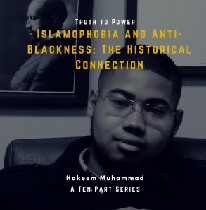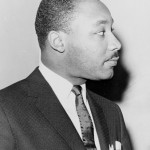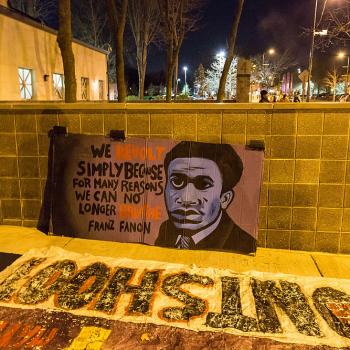Editor’s Note: This is part one of a ten part series exploring how anti-blackness and Islamophobia are interconnected.
A world which is anti-Black must be anti-Islam, because Islam in the psyche of white civil society has been a  formidable force in catalyzing resistance among Blacks to not acquiesce to the position of the slave. The historical record of European political theorists gives clear indication that the power of Islam functioned to them as a menacing impediment to their attempts to secure an unjust racial caste system that marked Blacks as slave flesh to be dominated by whites.
formidable force in catalyzing resistance among Blacks to not acquiesce to the position of the slave. The historical record of European political theorists gives clear indication that the power of Islam functioned to them as a menacing impediment to their attempts to secure an unjust racial caste system that marked Blacks as slave flesh to be dominated by whites.
According to Calvin Warren in Black Nihilism and the Politics of Hope, the horrific Middle Passage voyage trapped Blacks in a world of existential absurdity in which all, “meaning is lost for the black.” In the slave narrative of Abu Bakr, he demonstrates an unbreakable conviction in Islam that actively ruptures the nihilism that the Middle Passage sought to solidify:
” I tasted the bitterness of slavery from them and its oppressiveness. But praise be to God under whose power are all things. He does whatsoever he wills! He is our master. In God, therefore let all the faithful put their trust!”
Abu Bakr could be alienated from kinship structures and his culture, but not his relationship with God, whom he acknowledges as his true master. As a hafi of the Qu’ran, Abu Bakr would have been familiar with verses urging believers to be unwearied in the face of hindrances and to never let any worldly catastrophe disturb their peace of mind or purpose.
With firmness of purpose, Black Muslims enduring captivity in Brazil commemorated the projected anniversary of the Qur’anic revelation to the Prophet(pbuh) known as the Night of Power, by initiating what historian Reis referred to as “the most effective urban slave rebellion ever to occur on the American continent.” Licutan, an Islamic scholar and the mastermind behind the revolt, would be placed under interrogation after the revolt was finally quelled.
When Licutan would be asked for his name, court documents reveal that he continuously referred to himself as a Bilal. Both the judge and the court prosecutors were infuriated by this action, insisting that they knew his actual name was Licutan, oblivious to the symbolic significance. Licutan was identifying with a leading companion of the Prophet Muhammad(pbuh), Bilal Ibn Rabah(RA)!
The Male’ Slave Revolt and The Middle Passage
The aim of the Middle Passage was to trap Black into a world of existential absurdity by robbing them of any purpose outside of that of a tool. Despite this objective, historian Dr.Enrico Dal lago indicates that the Black Muslim slave rebellion in Brazil, “followed a similar pattern to the jihad that characterized Sokoto expansion, almost to the point of being a transatlantic extension of the latter in the Americas.” If the Male’ Slave Rebellion was a transatlantic extension of the Islamic movements that went into the establishment of the Sokoto Caliphate, then far from succeeding in robbing Black Muslim slaves of meaning, many who experienced the Middle Passage, merely saw it as a free voyage granting them to opportunity to struggle for Islam in the western hemisphere!
While the Middle Passage sought to destroy within its victims the ability to determine their own meaning, Islam provided slaves with active resistance to this process. What was to be done about a belief set that still inculcated within its followers meaning, purpose, and unending determination even after the Middle Passage? Dr. George Junne notes that African Muslims were heavily persecuted and even African ethnic groups merely thought of having Muslim ties were treated by authorities with extreme caution.
Anti-Black Epistemology and Islamophobia:
Uncoincidentally, Anti-Black political treatise among Europeans often correlated with rampant Islamophobia. Meticulous in their ardent desire to maintain an anti-black world in the face of revolts, Stoddard Lothrop, a European political thinker would publish the book The Rising Tide of Color Against White World-Supremacy. This book was not a fringe publication, rather it influenced the elites in white civil society, having been read and even recommended by President Warren G. Harding.
Stoddard gives an account of how the various religions of Blacks would impact the European quest for racial supremacy, Stoddard writes, “In so far as he is Christianized, the Negro’s savage instincts will be restrained and he will be disposed to acquiescence in white tutelage. In so far as he is Islamized, the negro’s warlike propensities will be inflamed…” Though in Stoddard’s analysis Blacks are naturally bestial, savage, and warlike, he firmly believed that Christianity would be able to tame these tendencies and cause them to accept white dominance.
At the top of the priorities for Stoddard stopping the spread of Islam among Blacks, he writes, “Islam is as yet unknown south of the Zambezi, but white men universally dread the possibility of its appearance, fearing its effect upon the natives.” In their mind, Blackness within Christianity came to represent Blackness tamed and unable to resist the anti-black world, whereas blackness with indigenous African faiths came to represent blackness in a savage, bestial, and primitive state but one that could potentially be open to Christian civilizing.
Thus, Blackness with Islam represented something untamable and irredeemable. Blackness in opposition to white dominance and an amplification of the inherent warlike qualities they believed were already inherent in Blacks that would fiercely threaten their agenda for racial supremacy.
The universal dread of Islam that Stoddard speaks of existed among white civil society demonstrates that Islamophobia manifests as a fear that Islam would motivate Blacks to not accept the position of a slave and to actively resist it.
—–
In part two of the series, we will examine the cosmological significance of Black Muslims in Brazil choosing Layl Qadr to spark their slave rebellion and Licutan’s identification with Bilal Ibn Rabah(RA).












